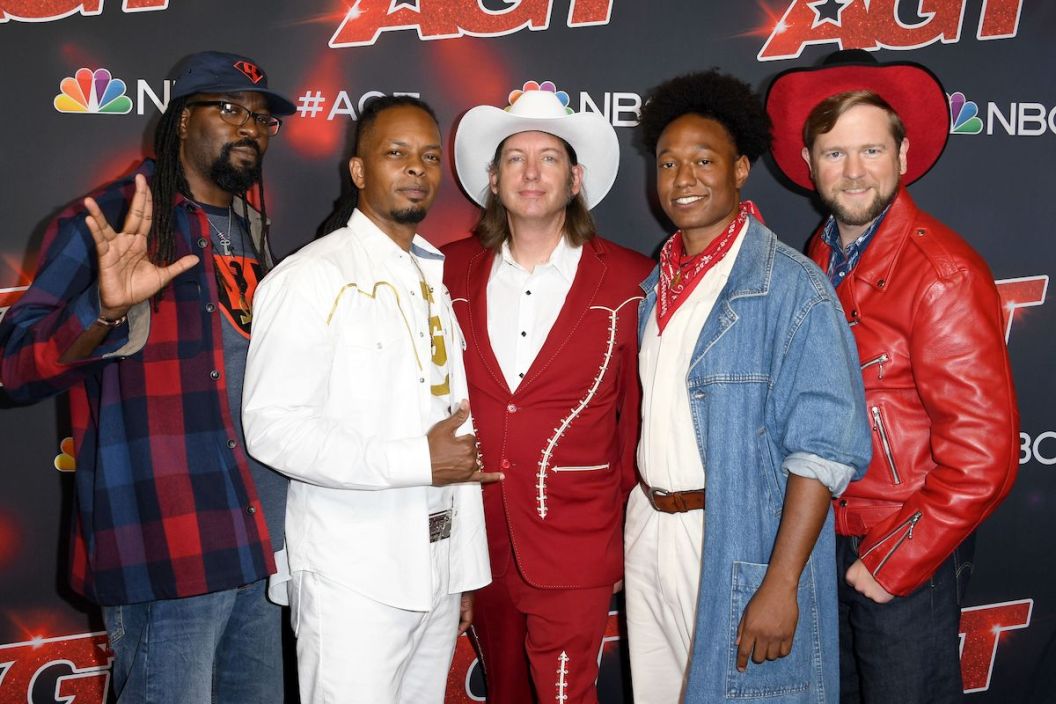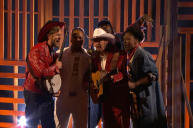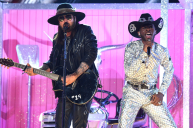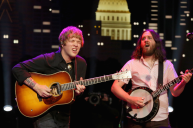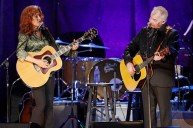As its band name gives away, Gangstagrass incorporates foundational elements of two seemingly opposite forms of musical expression. Yet despite mainstream exposure from T.O.N.E-z collaboration "Long Hard Times to Come" -- the Emmy award-nominated theme song for TV's Justified -- and other career-affirming benchmarks, the group's fusion of hip-hop beats and rhymes with bluegrass instrumentation remains a stumbling block for playlist curators and potential listeners.
Videos by Wide Open Country
"It is a hard sell sometimes when you tell people what it is that we're doing," R-SON the Voice of Reason, a Philadelphia rapper and vocalist for Gangstagrass, told Wide Open County. "You get looks and strange responses like, 'What the hell?' When they hear it and they are exposed to the music and the performance and the energy of it, particularly live, most people get it."
R-SON and Brooklyn, N.Y.-based producer Rench (vocals/guitar/beats) are joined in Gangstagrass by Dolio the Sleuth (vocals), Dan Whitener (banjo/vocals) and B.E. Farrow (fiddle/vocals). Together, they've found over the years that for even the pickiest rap and bluegrass traditionalists, hearing often leads to believing.
"The vast majority, even if they are super traditional [bluegrass fans], when they hear it and when they are exposed to it, there's no denying it. It's the same thing in hip-hop circles," R-SON added. "I'm from Philadelphia, and Philly hip-hop cats are some of the hardest dudes to impress in the world with anything. But when they hear it and the beats are dope and the rhymes are dope, that's all you really need. There's something about watching hip-hop cats watch a guy play the banjo and be like, 'Oh, damn!' Regardless of what anybody else is saying or how traditional you are about any of it, if in that tradition you are a fan of the ability of the artist, then there's no denying it."
Besides, Gangstagrass' harmonious mission shatters misconceptions about musical -- and personal -- differences.
"It is a lot of the same ideas, a lot of the same concepts, people coming from the same walks of life even though they're different geographically," R-SON said. "These are the sons and daughters of janitors and farmers and cats that are living on the edge for the most part. The artists in those realms are creating from that sort of mindset and building from an idea of 'this is what I have to express myself. Let me just do it.' Whether you're in the project hallways or on the porch somewhere, you're just expressing yourself and creating and expressing your stories. A lot of those stories are very similar, and what we've been doing is trying to get people to understand how many similarities exist in those stories. If the similarity exists in those, there's probably more similarities in your lives. On a bigger level, there are things we can talk about to try and take all of that and line it all up together and work together to make everybody's lives better."
Many dismissals of rap crossovers likely stem from such easy targets "Accidental Racist," a heavily-panned LL Cool J and Brad Paisley collaboration -- even if less flimsy examples like Public Enemy's groundbreaking work with thrash metal masters Anthrax prove greater cultural and musical possibilities.
"Any popular genre or successful genre of American music that you can name out there started as a fusion of existing genres," Rench added. "Also, part of the inspiration [for Gangstagrass] is the history of American music being people just pulling from all these different threads of culture that have come here and started intermingling and blending together."
To reach more ears after the pandemic halted live music and build off the success of No. 1 bluegrass album No Time For Enemies (2020), the group appeared in 2021 on America's Got Talent.
"If they're offering you the chance to go on national television, you might as well scoop up some new fans," Rench said. "We definitely screened them a lot first because we wanted to make sure that we were going to be presented the way we wanted to be presented, with the chance to be ourselves and put our message out there. They definitely bought in on letting us be ourselves."
Rench and R-SON both gushed about meeting Terry Crews, who'd defined a four buzzer audition performance of "Bound to Ride" as "Hee Haw hip-hop" -- a label as apropos as the title of the group's 2012 album, Rappalachia.
Since returning to the touring circuit, the band's must-see live experience has remained its easiest selling point, with Rench quipping that many new fans "came to see a train wreck and left buying all of our CDs."
Cynics continually become instant converts, whether they were America's Got Talent viewers in 2021 or passers-by at festivals since then, for two reasons: the positive message of the band and the legitimacy of its elite hip-hop MCs and precise bluegrass pickers.
"These are really talented bluegrass musicians, and Rench is a fantastic hip-hop producer," R-SON said. "Myself and Dolio are both 100 percent hip-hop MCs. This is hip-hop life for us. It can't be anything less than dope because the people that are doing it really love the cultures involved and do the music in them very well."
READ MORE: The 40-Plus Year Evolution of Country-Rap in 15 Songs
